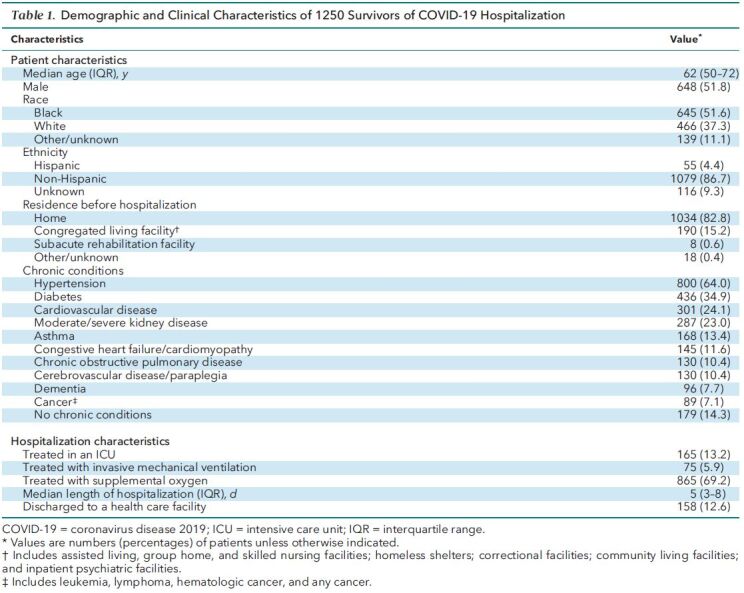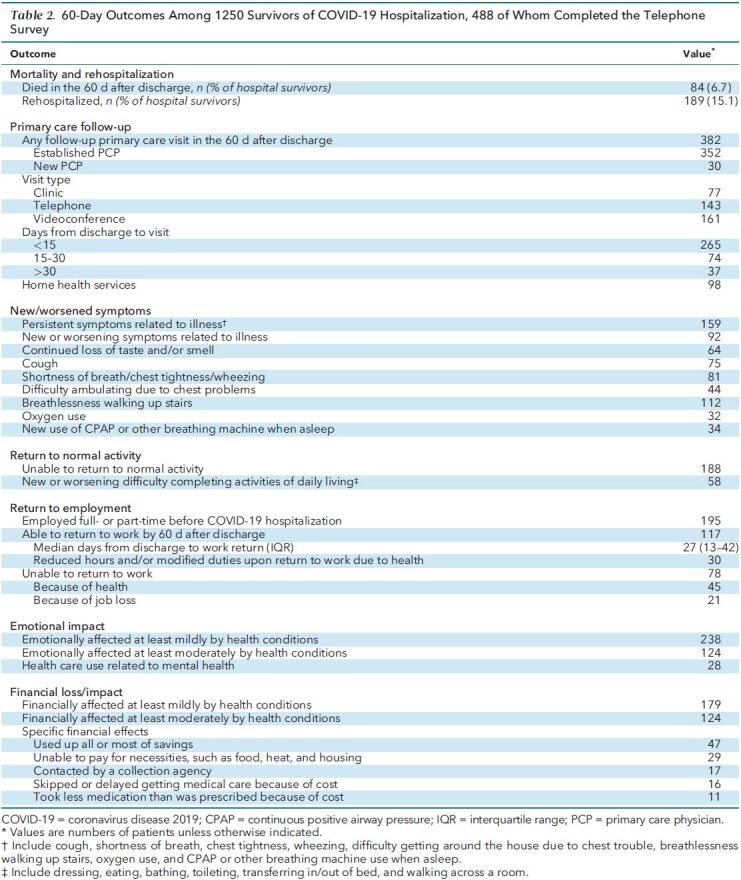Background: Although characteristics and in-hospital outcomes for persons with coronavirus disease 2019 (COVID-19) have been well described, less is known about the longer-term outcomes of hospitalized patients.
Objective: To describe 60-day postdischarge clinical, financial, and mental health outcomes of patients with COVID-19.
Methods: This observational cohort study looked at patients hospitalized with COVID-19 (discharged between 16 March and 1 July 2020) at 38 hospitals participating in the MI-COVID19 initiative. The aim of MI-COVID19, a Michigan statewide collaboration sponsored by Blue Cross Blue Shield of Michigan (BCBSM) and Blue Care Network, is to improve care for patients hospitalized with COVID-19. Trained quality abstractors (often registered nurses) collect data from patient medical records using structured templates. For hospitals unable to abstract all COVID-19 hospitalizations, a sample is selected for inclusion by using a pseudo-randomization procedure (minute of hospital discharge).
At 60 days after discharge, abstractors review the medical record to collect data on clinical events, including readmission (to the index hospital or any hospital viewable in the medical record) and postdischarge death. In addition, for all patients alive and not residing in a health care or correctional facility, abstractors contact patients by telephone to complete a survey about primary care follow-up, ongoing cardiopulmonary symptoms, return to normal activity, financial impact, and emotional and mental health outcomes. At least 3 attempts are made to contact patients. The study was deemed “not regulated” by the University of Michigan institutional review board (HUM 00179611).
Findings: Of 1648 patients with COVID-19 admitted to 38 hospitals, 398 (24.2%) died during hospitalization and 1250 (75.8%) survived. Of 1250 patients discharged alive, 975 (78.0%) went home whereas 158 (12.6%) were discharged to a skilled nursing or rehabilitation facility (Table 1). By 60 days after discharge, an additional 84 patients (6.7% of hospital survivors and 10.4% of intensive care unit [ICU]-treated hospital survivors) had died, bringing the overall mortality rate for the cohort to 29.2%, and 63.5% for the 405 patients who received treatment in an ICU. Within 60 days of discharge, 189 patients (15.1% of hospital survivors) were rehospitalized.
Table 1. Demographic and Clinical Characteristics of 1250 Survivors of COVID-19 Hospitalization.

Of patients alive 60 days after discharge, 488 (41.8%) were successfully contacted and completed the 60-day postdischarge telephone survey. Of these, 265 reported seeing a primary care physician within 2 weeks (Table 2). Most follow-up visits (304 of 382) occurred virtually by videoconference (161 of 382) or telephone (143 of 382), whereas 77 occurred in person and 1 was of unknown format.
Table 2. 60-Day Outcomes Among 1250 Survivors of COVID-19 Hospitalization, 488 of Whom Completed the Telephone Survey.

Cardiopulmonary symptoms (such as cough and dyspnea) were reported by 159 patients, including 92 with new or worsening symptoms and 65 with persistent loss of taste or smell. Fifty-eight patients reported new or worsening difficulty completing activities of daily living. Among 195 patients who were employed before hospitalization, 117 had returned to work whereas 78 could not because of ongoing health issues or job loss. Of the 117 patients who returned to work, 30 reported reduced hours or modified duties due to health reasons.
Nearly half of all patients (238 of 488) reported being emotionally affected by their health, and 28 sought care for mental health after discharge. Moreover, 179 patients reported at least a mild financial impact from their hospitalization, with 47 reporting use of most or all of their savings and 35 rationing food, heat, housing, or medications due to cost.
Discussion: In this multihospital cohort of patients hospitalized with COVID-19 in Michigan, nearly 1 in 3 patients died during hospitalization or within 60 days of discharge. For most patients who survived, ongoing morbidity, including the inability to return to normal activities, physical and emotional symptoms, and financial loss, was common (1). These data confirm that the toll of COVID-19 extends well beyond hospitalization, a finding consistent with long-term sequelae from sepsis (2) and other severe respiratory viral illnesses (3). Although most patients saw a primary care provider after discharge, 1 in 5 had no primary care follow-up visit within 60 days of discharge. Collectively, these findings suggest that better models to support COVID-19 survivors are necessary (4).
Our study has limitations. Although postdischarge chart review was completed for all patients, telephone contact occurred in fewer than half. Loss to follow-up may be nonrandom; thus, the proportion of patients who had adverse outcomes may be biased. We therefore report numbers of events, which should be interpreted as the minimum known number of patients with a given outcome. Despite these limitations, our study conveys that adverse events after COVID-19 hospitalization are common. Policies and clinical and research programs targeting these aspects are needed.
Footnotes
This article was published at Annals.org on 11 November 2020
References
- 1. Carfì A , Bernabei R , Landi F ; Gemelli Against COVID-19 Post-Acute Care Study Group. Persistent symptoms in patients after acute COVID-19. JAMA. 2020;324:603-5. [PMID: ] doi: 10.1001/jama.2020.12603 [DOI] [PMC free article] [PubMed] [Google Scholar]
- 2. Prescott HC , Angus DC . Enhancing recovery from sepsis: a review. JAMA. 2018;319:62-75. [PMID: ] doi: 10.1001/jama.2017.17687 [DOI] [PMC free article] [PubMed] [Google Scholar]
- 3. Ahmed H , Patel K , Greenwood DC , et al. Long-term clinical outcomes in survivors of severe acute respiratory syndrome and Middle East respiratory syndrome coronavirus outbreaks after hospitalisation or ICU admission: a systematic review and meta-analysis. J Rehabil Med. 2020;52:jrm00063. [PMID: ] doi: 10.2340/16501977-2694 [DOI] [PubMed] [Google Scholar]
- 4. Prescott HC , Girard TD . Recovery from severe COVID-19: leveraging the lessons of survival from sepsis. JAMA. 2020;324:739-40. [PMID: ] doi: 10.1001/jama.2020.14103 [DOI] [PubMed] [Google Scholar]


